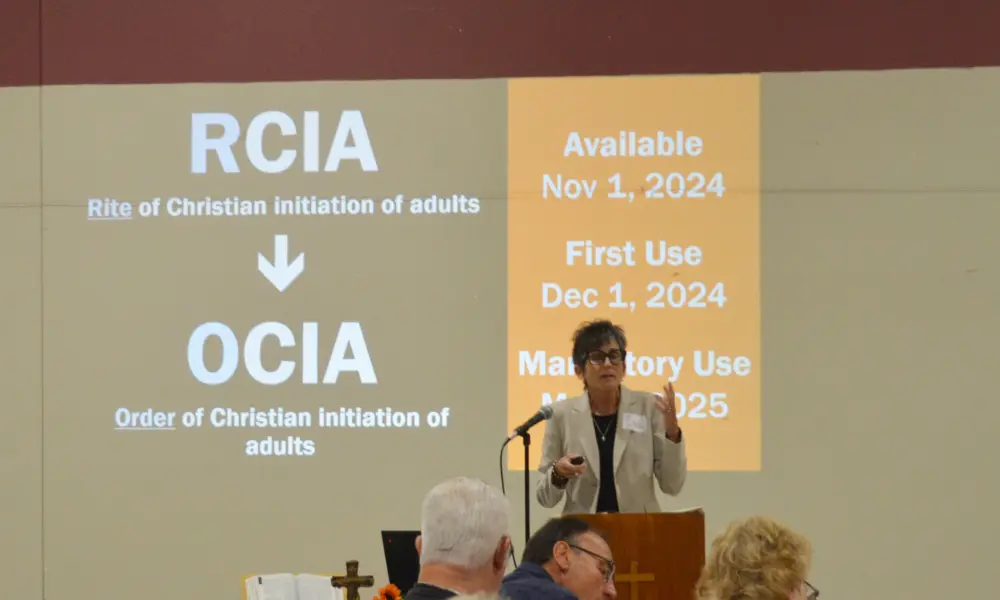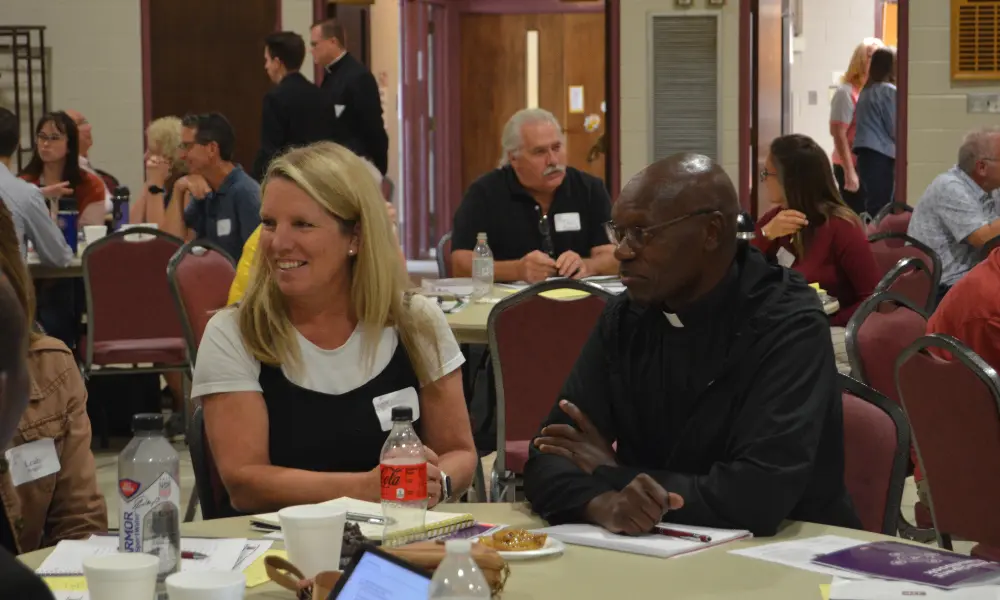Process of welcoming new Catholics gets update
September 19, 2024

Keen observers among the faithful of central and southwest Iowa may soon begin to notice a change in language around their parishes: bulletins and announcements later this fall may begin to use the acronym “OCIA” to refer to the process by which adults join the Catholic Church.
Catholics have been used to RCIA -- the Rite of Christian Initiation of Adults -- for some decades now, referring to the renewed process of welcoming new adult Catholics, which was inaugurated after the Second Vatican Council. Now, we prepare to implement the Order of Christian Initiation of Adults. What’s going on?
Just as the Roman Missal (the official texts of the Mass) was re-translated from the original Latin text some years back (remember when the Mass responses changed?), so too the other rituals of the Church are slowly being re-translated.
Baptism, confirmation, and marriage are among other liturgical texts that have received updated translations. They too changed from being referred to as “rites” to being now called “orders,” more closely reflecting the original Latin titles.
This change, however, is not mere ecclesiastical wordsmithing. Particularly with OCIA, there is an important emphasis that begs us take note when we use the word “order.”
Far from being a simple ritual by which individuals are simply inducted as members, the Order of Christian Initiation of Adults invites those seeking full communion with the Catholic Church on a journey of conversion and encounter with Jesus Christ, his Word, and his Church.
Getting to know Jesus cannot end with the celebration of the sacrament of confirmation. Everyone is invited to make a life-long journey of conversion and discovery with the Lord.
Any time the Church renews a liturgical translation, new emphasis is brought out of the text and proposed for reflection and adoption.
For many decades now, RCIA has been an experience which tends to kick off in the fall and carry through to the Easter Vigil. OCIA challenges us to think differently. As the late (and great) Father Bob Aubrey remarked recently, where RCIA has become heavily tied to the academic year, OCIA invites us to think more liturgically and communally about Christian initiation and formation, meeting people where they are; inviting them on a lifelong journey to encounter the Lord Jesus.
One of the distinctions OCIA brings out that, while present in RCIA, was perhaps a tad lost, is the distinction between those persons approaching the Church to join who have less experience of Jesus and have never been baptized (called “catechumens”) and those who are coming as baptized Christians from another denomination, having already walked with the Lord in their lives (called candidates) for full communion.
For the catechumen (non-baptized), OCIA offers a rich journey composed of five stages which seeks to introduce the catechumen to the Christian life and faith. This almost always ends with the catechumen being baptized, confirmed, and admitted to Holy Communion at the Easter Vigil.
For those who come already baptized as Christians but not yet Catholic, the Church recognizes that their walk with Jesus isn’t beginning at square one. Their formation should be more individually tailored and seek to meet them where they are in their walk with Christ. Thus, they may be received into the Church at any point in the year, whenever their pastor and those preparing them for reception into full communion deem them to be ready.
Far from ending their formation in the faith, such a reception of the sacraments of initiation starts the new Catholic on a journey which will last the rest of their lives.
Some parishes have already made this adaptation and distinction. I encourage all parishes to think creatively to meet these Christians where they are in their walk with Christ. Larger parishes may choose to receive candidates at several fixed points in the year in cohorts, smaller parishes may be able to take on a truly one-on-one approach. I hope all of those involved in this ministry can get creative and ask themselves how they can respond to Pope Francis’ call to truly accompany those who come to us seeking full communion.
On Sept. 14, catechetical leaders across the Diocese met in Atlantic to discuss OCIA. We discussed both the richness of the journey for Catechumens and strategies for welcoming those already baptized. We were blessed to be led by several master catechists who work with Liturgy Training Publications out of Chicago. Sessions were offered in both English and Spanish.

Fr. Protas Okwalo, SJ and Julie Solkowski during a small group discussion at the OCIA workshop.
I have to give a shout-out to my friend and colleague, John Gaffney, the diocesan director of Evangelization and Mission, and his team who put together this opportunity for our parishes at no cost to them.
The updated OCIA texts will begin to be used starting Dec. 1. Please pray for all of us who work with those seeking to join our Catholic family as we strive to offer a welcoming and rich journey for all seeking to become Catholic, both those Catechumens needing Baptism and those Christians who come to us already baptized.
May we welcome them with the joy of the Gospel, sewing seeds of true communal encounter and life-long discipleship.
What are the steps of bringing someone into the Catholic Church?
There are five stages to becoming Catholic and growing more deeply in one’s relationship with Jesus and others.
1. Pre-catechumenate
This is a phase of inquiry, when one wants to get to know more about the Church. Parishioners may pray with the individual, invite him or her to gatherings and Mass and cultivate friendship with the inquirer. This is a phase in which one’s marital status is reviewed so that any impediments to their eventual celebration of the sacraments is known and addressed early on.
2. Catechumenate
If there is interest in learning more about the Catholic Church, the Rite of Acceptance is celebrated and a more formal catechesis process begins. For some, it may be a short period of time. This could include someone who has been attending Mass for a long period of time, or who has participated in their children’s growing faith. Ordinarily this period is to last from Easter to Easter so that the person experiences a full liturgical year.
3. Purification
This is a stage at which one asks if God is really leading them to the Catholic Church. Hopefully, the person begins to see where God is working in their life.
4. Easter Vigil
It is at this celebration where catechumen (who have never been baptized) and candidates (who were baptized in another Christian tradition, or someone who has not received all three initiation sacraments of baptism, First Eucharist, and confirmation) come into full communion with the Catholic Church.
5. Mystagogy
The process doesn’t end with Easter. In some ways, it’s just beginning. Ongoing learning about the Church, the parish, and why we do what we do, continues while one is encouraged to not just study the faith, but live the faith by helping the needy, assisting other parishioners, and giving of time, talent, and treasure. Mystagogy is a lifelong process.